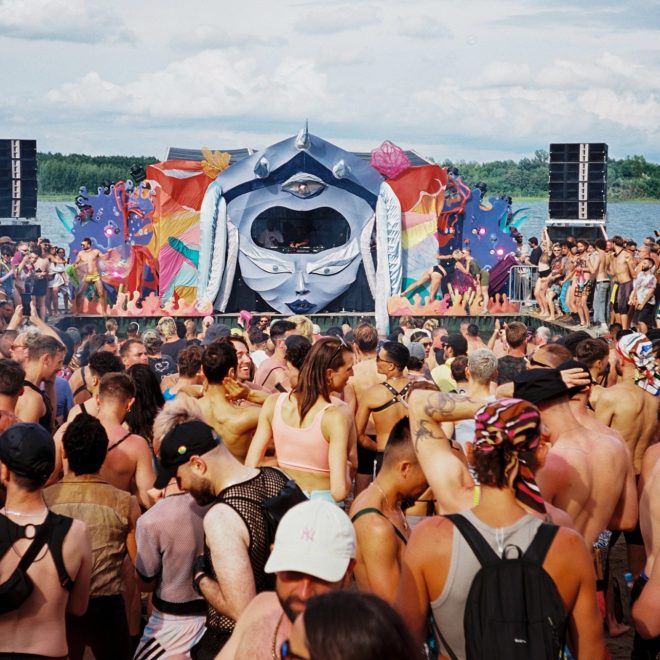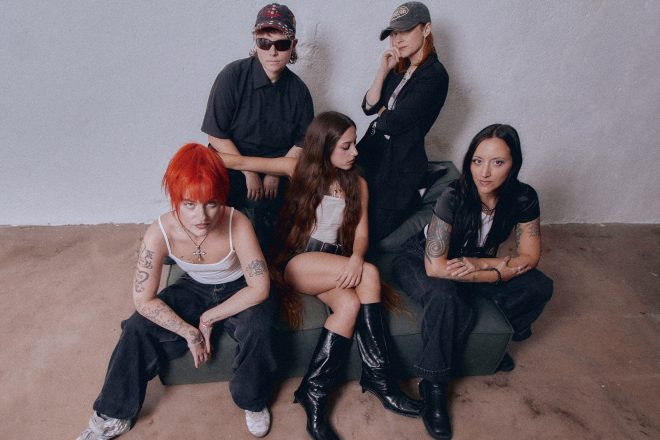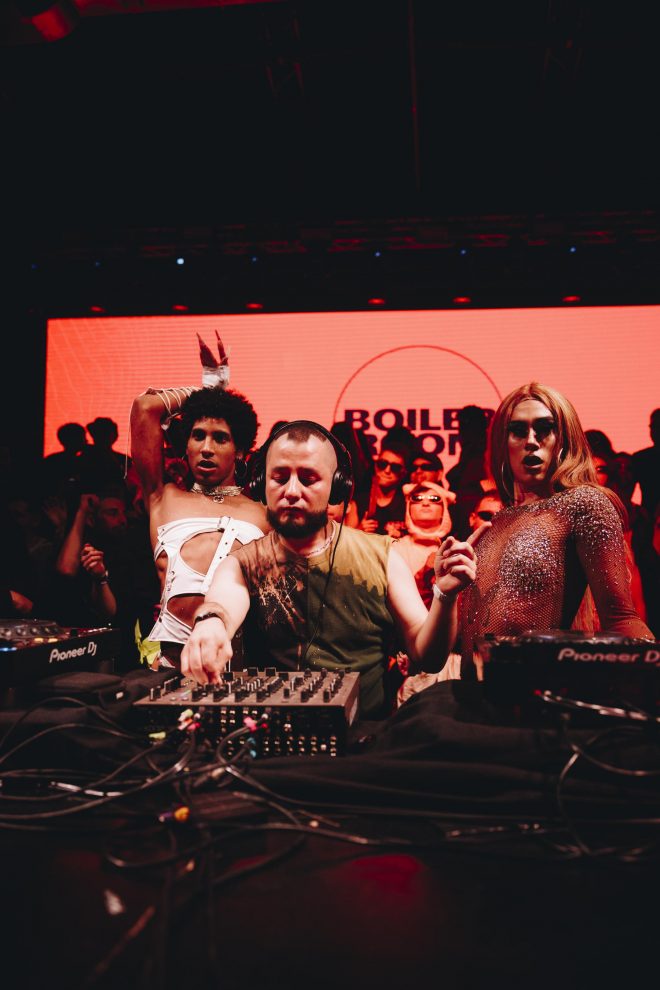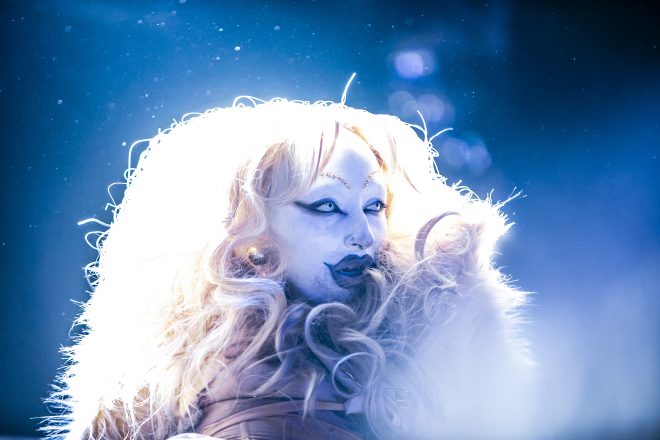Conectando Culturas: Spanish-Speaking Collectives Bridge Europe and Latin America at WHOLE 2025
From Barcelona's FLINTA* spaces to Santiago's resistance culture, Me Siento Extraña and Fiesta Dame forge new pathways

This weekend, Germany's WHOLE Festival welcomes eleven new collectives to Ferropolis for the first time. As the festival expands its global reach, two Spanish-speaking collectives stand out for their shared commitment to creating authentic spaces for marginalized communities while challenging traditional boundaries in electronic music culture.
From Barcelona to Santiago, Me Siento Extraña and Fiesta Dame each bring distinct approaches to community building within their local queer electronic music scenes. While separated by an ocean and cultural context, these collectives share common concerns: how to create meaningful spaces for marginalized communities, how to build sustainable support systems for artists, and how to maintain authentic local identity while engaging with global networks.
Their participation at WHOLE reflects the festival's expanding role as a platform for regional scenes previously underrepresented on international stages, and demonstrates how shared language can become a bridge for deeper cultural exchange across continents.
Me Siento Extraña: Language, Identity, and Transnational Networks (Barcelona, Spain)
Barcelona's Me Siento Extraña has spent three years transforming the word "extraña" (strange, other, foreign) from a term of marginalization into a banner of belonging. Founded in 2021 by Maia Jenkinson and Verushka Sirit, the collective has evolved from local weekly gatherings into an international network that spans multiple continents while maintaining focus on FLINTA* artists and community care.
"Since we started Me Siento Extraña in 2021, the collective has been in constant evolution with community at the heart of it," they explain. "We soon realized that defining ourselves only as a space for lesbians wasn't enough; we needed to hold space for the whole spectrum of FLINTA*, whose identities are in a constant state of questioning and experimentation."
At WHOLE 2025, this evolution translates into what they describe as "a small opening ritual: a sonic offering that blends textures, rhythms and emotions to dissolve binaries and invite collective liberation."
Building Spaces Beyond the Dancefloor
The collective's approach extends far beyond traditional club programming. Their weekly Monday afternoon sessions represent a radical reimagining of when and how queer spaces can exist: "Our weekly Monday events have become a core pillar of the MSE community. They've shown us that queer spaces don't only belong to the night—they can also exist in spaces of care, learning and soft connection."
This consistency carries political weight. "Since we opened, we haven't missed a single week of our Monday event, creating a consistent, familiar space that we can always turn to. Especially when other family ties are distant or nonexistent, we want this meeting point and connection to exist for our communities," they explain. "Holding space consistently every week is also a political act—it affirms that our presence, joy and rest deserve structure and continuity too."
The collective's programming showcases remarkable diversity, having featured everyone from politician Ada Colau to poet Pol Guasch, visual artist Alba G Corral, and musicians like oqbqbo (Posh Isolation) and Maria Arnal. "Within our community, artistic expression takes many forms. Music is just one of them, and often overlaps with others like visuals, poetry, performance or DIY production," they note. "We're interested in how people create from the margins, how knowledge is shared collectively, and how art can grow outside traditional systems."
Beyond geographic boundaries, Me Siento Extraña has built what they describe as "transnational networks" connecting FLINTA* communities across cities like NYC, Paris, Berlin, Madrid, Roma and Amsterdam. "Collaborating beyond borders has been essential. Connecting with collectives in cities like NYC, Paris, Berlin or Amsterdam has allowed us to exchange tools, expand our perspective and share what we've built in Barcelona," they explain. "These partnerships remind us that queer community is both rooted and transnational. Building alliances is part of how we resist isolation and keep the movement alive."
Their Safe Amorx initiative exemplifies their commitment to creating genuinely safer spaces: "We know that nightlife isn't inherently safe, and for our communities, vulnerability isn't theoretical—it's part of daily life. That's why we created Safe Amorx, a collective awareness team grounded in care, accountability, and presence. It's a process, and we're still learning, but we believe it's essential to rethink how we party. Nightlife should be designed with care, not just curated for hype."
Sonic Identity and Feeling Over Genre
The collective's musical identity emerges from their diverse residents: Verushka, Meritxell de Soto, Hello Sasy, and Coolkid2000, each bringing distinct approaches that collectively define MSE's approach to sound.
"They're chosen family and hold the heart of what we do. Each of them brings a different sound, energy and approach, and that diversity is what shapes the MSE identity," the collective explains. "For us, queer sonic language isn't fixed: it's layered, emotional, sometimes soft, sometimes heavy. Our residents remind us that feeling always comes before genre."
This philosophy extends to their understanding of language itself: "Extraña has often been a word used to other us, something that doesn't quite belong. Reclaiming it is how we take back space through language, naming ourselves on our own terms. At our events, that feeling is shared. It's a place for everything that sits outside the norm, where sound, care and community make space for what's strange, soft or undefined."

From left to right: @hello.sasy @coolkid_2.000 @meritxelldesoto @maia_jenkinson @verushkasirit
Fiesta Dame: Cultural Resistance in Santiago (Santiago, Chile)
Santiago's Fiesta Dame represents more than just another addition to WHOLE's international lineup—they embody cultural resistance in its most essential form. For Fiesta Dame, their work exists at the intersection of artistic expression and survival, creating what they describe as "a space of resistance and freedom for the LGBTQ+ community in Santiago."
"Representing Chilean queer culture on an international stage is a huge responsibility and an honor," explains NSPERGER, the collective's resident DJ and co-founder. "We are proud to bring our stories, struggles, and celebrations to the world, creating the opportunity to connect with other communities and learn from their experiences."
Fiesta Dame emerges from Santiago's complex cultural landscape, where systematic marginalization has made their work essential for community survival. As local media El Desconcierto noted in their coverage of the collective: "In a social environment where gender violence and discrimination continue to be part of everyday life, DAME stands out as a space where everyone can be who they really are, without fear of being judged."
More Than Music: Multidisciplinary Resistance
The collective's approach extends far beyond traditional club programming. "DAME is a party made by and for Latinx sexual diversity. It is built as a space where the boundaries of gender and sexuality blur, allowing each individual to explore and celebrate their true selves," they explain. "In our space, you won't just find music; DAME also creates open spaces for different disciplines of art and performance."
This multidisciplinary vision stems from understanding that resistance requires multiple forms of expression. "Every performance is an opportunity to celebrate our diversity, break barriers, and challenge traditional norms of the music scene," NSPERGER notes. Their events feature what El Desconcierto describes as "innovative performances, international DJs and a staging never before seen in Chile," representing "a tangible manifestation of diversity and freedom of expression."

Photo Courtesy of NSPEERGER
The collective's programming challenges traditional boundaries while maintaining community intimacy: "We implement elements that encourage interaction and recognition, creating spaces where people can feel part of something bigger. Through music, art, and performances, we seek not only to entertain but also to inspire our community to actively participate, where they can contribute and build the same atmosphere."
Global Recognition, Local Empowerment
For Fiesta Dame, their WHOLE invitation carries significance that extends far beyond individual recognition. "The Chilean scene is incredibly powerful, and when these types of invitations are generated, local artists and attendees feel a greater level of ownership and empowerment to continue creating music, art, performance, etc.," they observe.
This impact manifests in tangible ways within Santiago's creative community. "We've received numerous messages of support and congratulations from the community, which underscores the importance of this invitation. This positive energy not only reinforces our commitment to our beliefs but also creates a sense of belonging among artists and attendees," NSPERGER explains. "When a global platform recognizes our work, it feels like a celebration of our cultural identity and our shared struggles."
Their participation represents broader questions about Latin American representation in international electronic music culture. "We believe that inviting Latin American artists not only promotes the culture of our region but also strengthens collaborative networks between artists from different regions," they state. General Producer Felipe Sepúlveda adds: "Each community has its own stories and nuances, and by sharing them, we contribute to a richer and more diverse range of experiences within the global scene."
Shared Foundations: Language as Cultural Bridge
What emerges from both Me Siento Extraña and Fiesta Dame's approaches isn't just linguistic similarity, but shared recognition that sustainable queer community requires active, ongoing work beyond booking DJs and opening doors. Both collectives demonstrate that meaningful space-making involves addressing community members' varying needs and access levels—whether through MSE's Safe Amorx initiative or Fiesta Dame's multidisciplinary resistance framework.
Their participation at WHOLE represents more than Spanish-speaking additions to the festival lineup. These collectives embody how shared language can facilitate deeper cultural exchange, demonstrating how local scenes maintain distinct identities while building transnational networks of support and solidarity.

Next: West Coast Energy - How American Underground Scenes Are Reshaping International Festival Culture
WHOLE Festival is taking place across 18-21 July at Ferropolis, Gräfenhainichen, Germany: connect with WHOLE Here: Website | Instagram | SoundCloud


